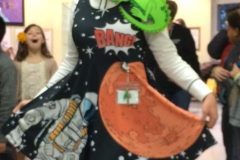Heather Perry, History, UNC Charlotte
WWI is the root of our modern society and it is all around us in ways that most people are unaware. Moving away from a strictly “military history” or “battlefield history” of WWI and instead looking at it through the “War’s Impact on Society” reveals a truly fascinating moment of transformation. There are many ways to take the history of WWI – which many see as irrelevant or boring and connect it to crucial elements of modern society, politics and culture.
The crux of this seminar is to find ways to engage students in unfamiliar history by showing its relevance to contemporary objects, politics, rituals, literature, and everyday culture. We will focus on the social, cultural, and local impacts of the First World War. Most people consider the war from a strictly military point of view — if they consider it at all. But WWI also marked the emergence of modern art, literature, and music. It transformed the identities of all Americans and opened new chapters in race and gender relations. Medical and technological advances from the war came home and transformed American lives. Fellows will first look at how WWI shaped the modern American economy, environment, art, music, race and gender relations. Then we will look more closely at how the war impacted Charlotte and the Carolinas in particular, including establishment of the US Army military training camp at Camp Greene in Charlotte, and the first US internment camp for German prisoners in Hot Springs, NC. We will examine how WWI transformed Charlotte from a minor city to a Southern crossroads and metro center and the wider impacts on commerce, trade and agriculture in the Carolinas. Possible field trip ideas include the Carolina Room at the Charlotte Mecklenburg Library, the Atkins Library Special Collections at UNC Charlotte, the Levine Museum of the New South, Charlotte Museum of History and the Bechtler Art Museum of Modern Art. Fellows will also explore how to use on-line tools and databases to create interactive learning activities for students (and learners of all ages).
SAMPLE TOPICS & IDEAS:
MUSIC AND MUSICAL ARTS:
- Composers who Fought in WWI – and how it influenced their work.
- Music from WWI – and its impact on soldier morale and/or popular culture
- WWI Music: Hidden Propaganda?
LITERATURE AND LITERARY ARTS:
- WWI Poetry – How WWI changed poetry
- WWI and the ‘Lost Generation’
- WWI Origins of the Harlem Renaissance
VISUAL ARTS & COMMUNICATION
- Impact of WWI on Art: Painting, Sculpture, Photography, Film
- Impact of WWI on forms of art & communication: film, radio
- Imperial War Museum collections
- Library of Congress WWI Rotogravures
- WWI in Painting
POLITICS & DIPLOMACY
- League of Nations: Precursor to United Nations
- Creating the Modern Middle East: Break-up of the Ottoman Empire
- Roots of the 1917 Russian Revolution
- Roots of Extremist Politics? Communism & Fascism
REMEMBERING WWI: THE ROOTS OF MODERN COMMEMORATION CULTURE
- Moments of Silence: From WWI to September 11th
- Recognizing the Fallen: Tomb of Unknown Soldier; Doughboy Statues
- From Armistice Day to Veteran’s Day: 1918 to the Present
- Why Poppy Flowers?
- Caring for Veterans: Creation of Veteran’s Bureau (becomes the VA)
AFRICAN AMERICAN LIVES & HISTORY
- African American Soldiers in WWI
- The Harlem Hellfighters
- WWI and Changing Race Relations in the US
CAROLINA EXPERIENCES OF WWI:
- Black Soldiers Mattered: Black North Carolinians in WWI
- Camp Greene & the Creation of Modern Charlotte
- Civilian Internment in Hot Springs, NC: Precursor to Japanese Internment in WWII
PRIMARY SOURCES & OTHER RESOURCES:
- Library of Congress online digital collections: https://guides.loc.gov/wwi/digital-collections
- WWI: America Heads to War https://dp.la/primary-source-sets/world-war-i-america-heads-to-war
- American Leaders Speak: Recordings from WWI https://www.loc.gov/collections/world-war-i-and-1920-election-recordings/about-this-collection/
Seminar Participants:




















 Home
Home